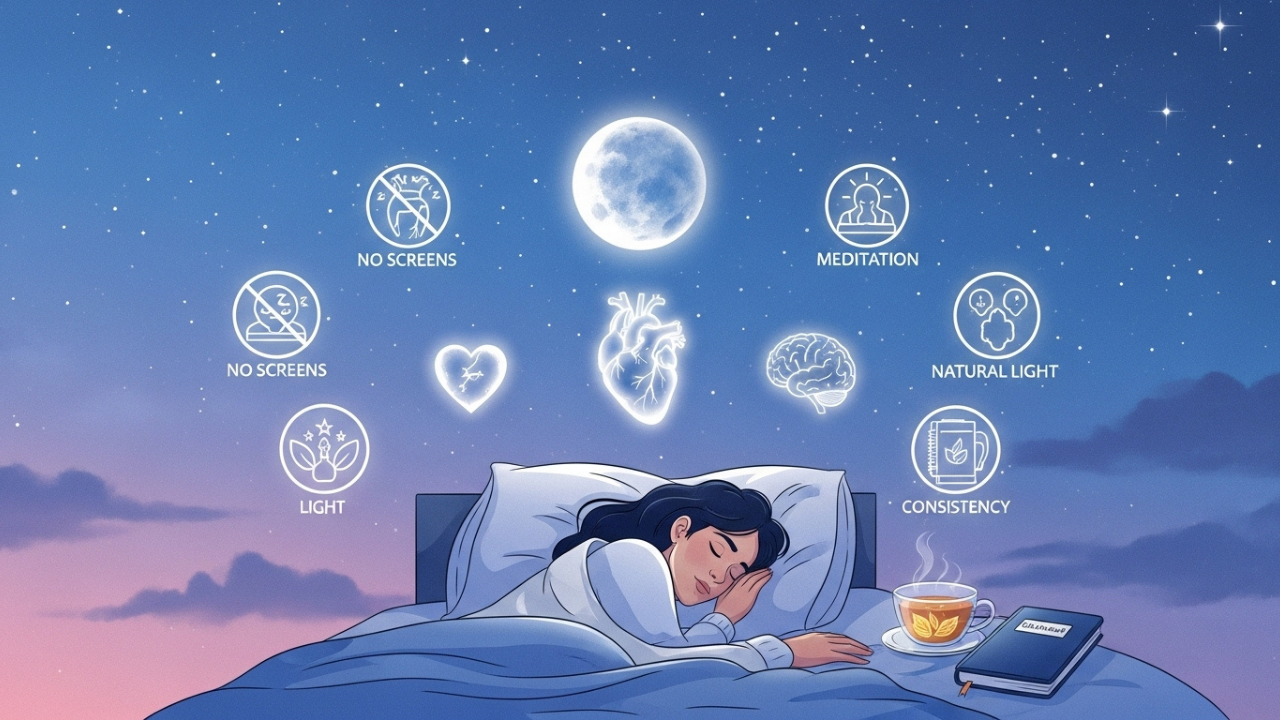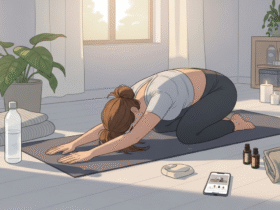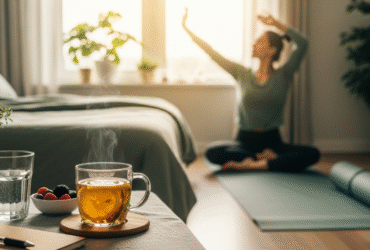🌙 Can’t Sleep? Here’s What Your Body Might Be Telling You
It’s 2 a.m.
You’re wide awake.
Not scrolling. Not working. Just… lying there.
Your body is tired, your brain is begging for rest — and yet, sleep won’t come.
If this sounds familiar, you’re not alone. And no, it’s not just insomnia, or bad luck, or a restless night.
The truth is: your sleep and your mental health are more connected than most of us realize.
🧠 Why Sleep Really Matters for Your Mind
Think of sleep like your brain’s personal clean-up crew.
While you’re resting, it’s processing emotions, repairing stress damage, and making space for clarity.
When sleep is solid — you think clearer, feel more stable, and handle stress better.
But when it’s off — even slightly — it can trigger anxiety, mood swings, and a short fuse.
In fact, research shows that poor sleep isn’t just a symptom of mental health issues — it can actually be a cause.
So if you’re working on your mental health but not prioritizing your sleep, you’re missing a huge piece of the puzzle.
🛌 How to Build a Sleep Routine That Supports Your Mental Health
This isn’t about getting “perfect sleep.”
It’s about creating calm, steady habits that invite rest — instead of chasing it.
Here’s where to start:
1. Sleep at the Same Time (Yes, Even on Weekends)
Your body loves rhythm.
Waking up and going to bed at the same time each day helps your internal clock (aka circadian rhythm) regulate hormones like melatonin and cortisol.
More rhythm = more emotional stability.
So even if your schedule isn’t perfect, aim for consistency over everything.
2. Turn Your Bedroom Into a Sanctuary
Your brain needs to associate your bed with one thing: sleep.
Not emails. Not snacks. Not Netflix.
Here’s how to help that association:
-
Keep the room dark and cool (around 65°F or 18°C)
-
Use blackout curtains or an eye mask
-
Remove clutter and distractions
-
Try calming scents like lavender or sandalwood
Let your environment say: “It’s safe to rest now.”
3. Power Down Screens At Least 1 Hour Before Bed
You’ve heard it before — but here’s the deeper reason:
It’s not just about the blue light.
It’s about the brain stimulation.
Scrolling, news, emails, endless notifications — they keep your nervous system activated.
Instead, wind down with:
-
A book (paper, not Kindle)
-
Calming music
-
Gentle stretching
-
Journaling
Your brain can’t sleep if it thinks it’s still “on.”
4. Create a Wind-Down Routine That Feels Like a Signal
Ever notice how kids need a bedtime routine?
Adults do too.
A warm bath.
A cup of herbal tea.
Some light stretching or meditation.
These aren’t luxuries — they’re sleep signals.
They tell your brain, “We’re done for the day.”
5. Watch Your Caffeine and Alcohol Timing
This one sneaks up on people.
-
Caffeine sticks around in your body for 6–8 hours. That late afternoon coffee could be the reason you’re tossing at night.
-
Alcohol might make you sleepy at first, but it disrupts deep (REM) sleep — often leaving you anxious or wired at 3 a.m.
If sleep is a goal, try switching to:
-
Herbal teas like lemon balm or valerian root
-
Golden milk (turmeric + warm milk)
-
Warm water with honey and cinnamon
Your nervous system will thank you.
6. Get Morning Sunlight (Seriously, It Helps)
Just 15–30 minutes of natural light in the morning can reset your body clock and boost your serotonin — which later helps melatonin rise naturally at night.
No sun? Sit by a window. Or take a quick walk.
Small action. Big results.
7. Declutter Your Mind Before Bed
If your brain feels like it’s running a meeting at midnight, try this:
-
Do a brain dump: Write down anything that’s looping in your head — tasks, worries, random thoughts.
-
Remind yourself: “I don’t need to solve this right now.”
-
Shift focus: Use mindfulness or calming breath work to re-center.
Mental clutter often weighs more at night. Journaling helps lighten the load.
8. Practice Gentle Mindfulness (Not Perfection)
No need to meditate for an hour.
Just try something like:
-
4–7–8 breathing: Inhale 4, hold 7, exhale 8 (repeat 3–5 times)
-
Progressive muscle relaxation: Tense and release muscles from toes to head
-
Visualization: Picture a calming place — beach, forest, mountains — and breathe into that scene
These are gentle ways to bring your body out of stress mode and into rest mode.
9. Keep the Bed for Sleep Only
Working in bed? Eating there? Watching TV?
Your brain starts to associate your bed with activity, not rest.
Break the pattern by:
-
Keeping screens and snacks out of the bedroom
-
Getting up if you can’t sleep within 30 minutes (go to a dim room, read, stretch — then try again)
Eventually, your body will get the message: “This space is for sleep.”
10. Rethink Naps
Quick naps can be refreshing — but long ones can mess with your night sleep.
If you do nap:
-
Keep it under 30 minutes
-
Avoid napping after 3 p.m.
If you’re already struggling with night time sleep, it’s better to skip naps and let tiredness build up for evening.
11. Try a 5-Minute Bedtime Journal
End your day with a quick journal — no pressure, no rules. Just:
-
What went well today?
-
What’s one thing on your mind?
-
What’s one thing you’re grateful for?
This simple ritual can reduce anxiety, offer emotional closure, and signal to your brain that it’s okay to shut down.
12. Create Your Own Sleep Checklist
Everyone’s sleep style is different.
What calms one person might irritate another — so tailor your routine.
Example:
| Habit | How Often? | Helps Me… |
|---|---|---|
| No screens 1hr before bed | 5x/week | Fall asleep faster |
| Herbal tea at 9 p.m. | 3x/week | Wake up less during night |
| Morning walk in sunlight | Daily | Boost morning focus |
| Journaling before sleep | 4x/week | Lower anxiety |
Track it. Test it. Tweak it.
💬 What If You’re Still Not Sleeping?
Sometimes, even with great habits, sleep just doesn’t come.
If you’re dealing with:
-
Constant insomnia (3+ nights/week for a month)
-
Waking up gasping or choking
-
Feeling tired after 7+ hours of sleep
-
Nightmares or anxious thoughts in bed
…it may be time to talk to a doctor or therapist.
Conditions like insomnia, sleep apnoea, or anxiety disorders are very real — and very treatable.
Final Thoughts | Your Mind Deserves Deep Rest
Sleep isn’t just “something we should do.”
It’s how your brain heals. How your emotions regulate. How your nervous system resets.
The good news?
You have more control than you think.
Start small.
-
Turn off your screen 30 minutes earlier.
-
Write one sentence in a notebook.
-
Take one deep breath, and say: “I’ve done enough for today.”
Repeat that rhythm. Gently. Consistently.
Because when sleep improves, everything changes — your mood, your clarity, your resilience.
And you deserve all of it.
Starting tonight. 🌙















Leave a Reply